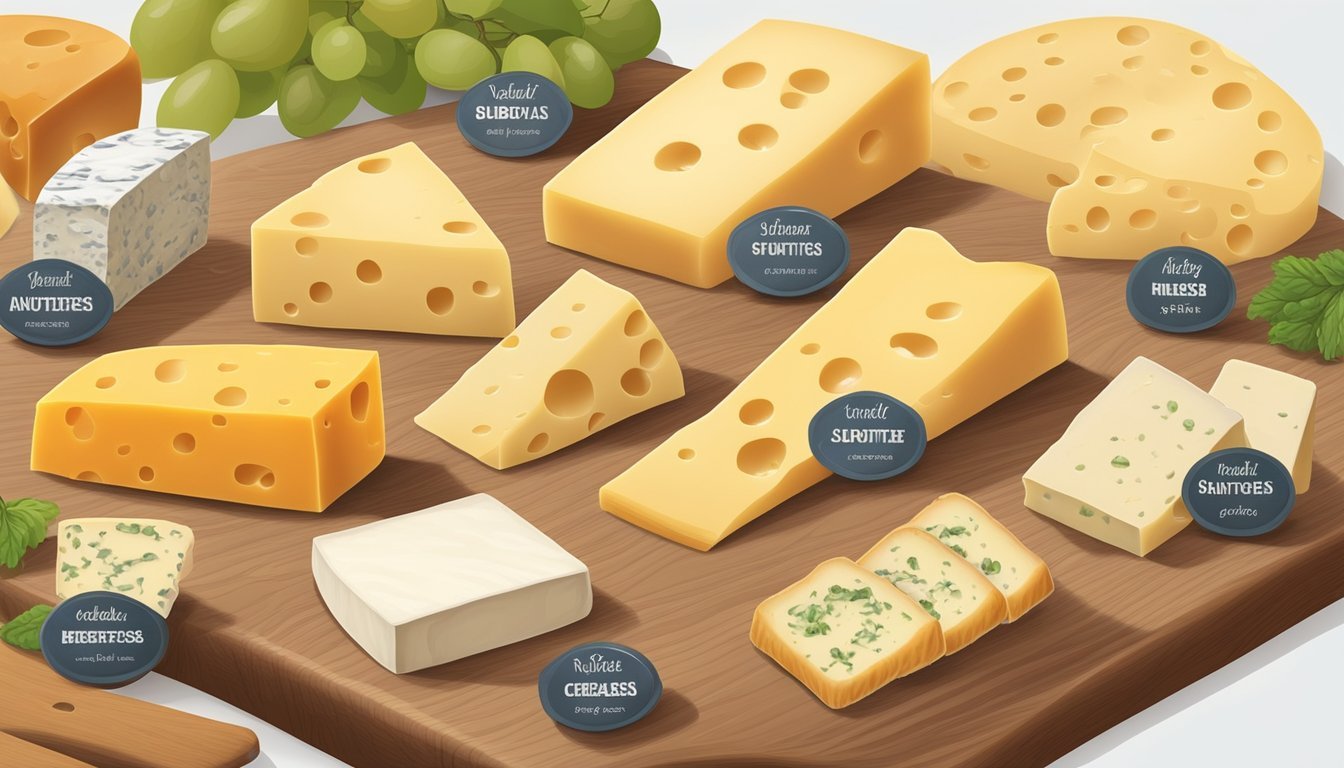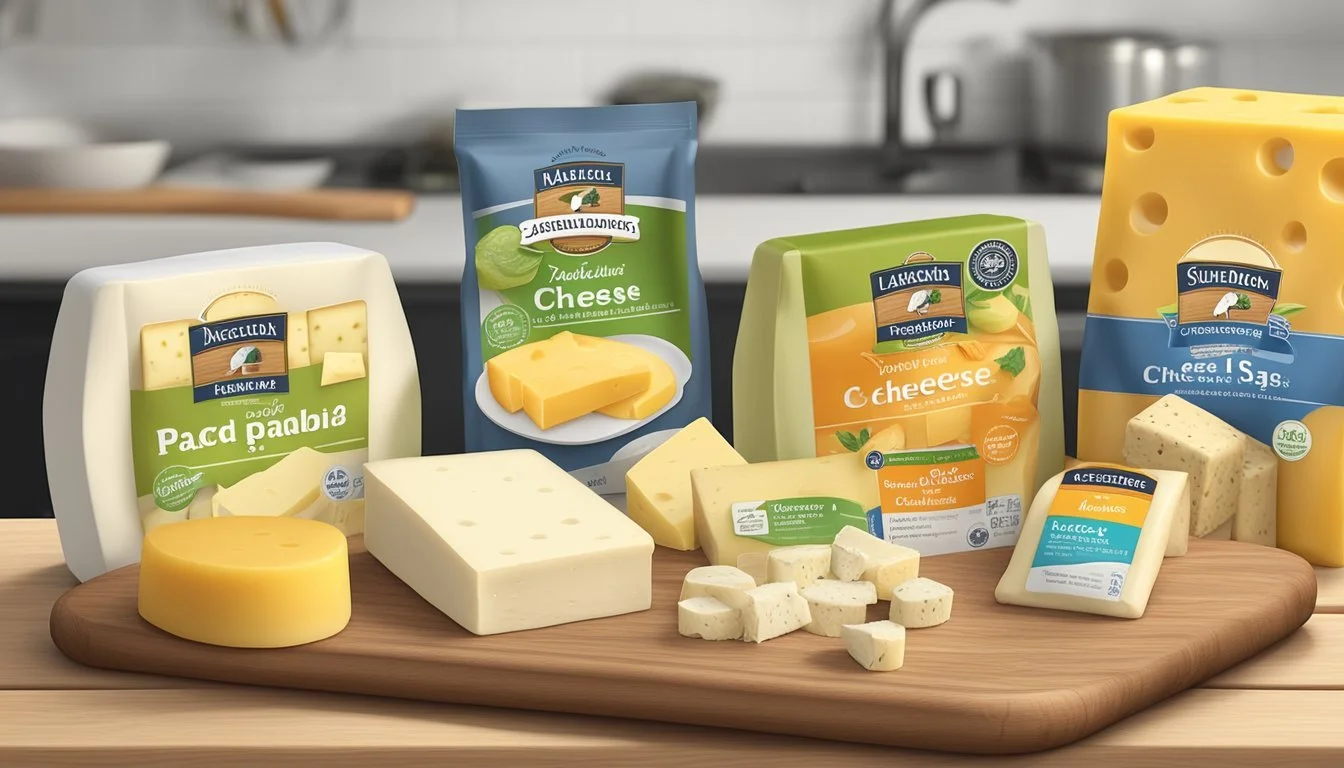Cold Pack Cheese Substitutes
Alternatives for Lactose-Intolerant Consumers
Cold pack cheese (What wine goes well with cheese?), also known as club cheese, comminuted cheese, or crock cheese, is a type of spreadable cheese product that's made by blending one or more types of natural cheeses. Unlike other cheese varieties that are heated and pressed into shape, cold pack cheese is made without the application of heat, which helps to retain the distinct flavors and textures of the original cheeses. This cheese variant is a popular choice for snacking and is often enhanced with additional ingredients like spices, fruits, or vegetables for added flavor.
When it comes to substituting cold pack cheese, there are several options available for those who are looking for alternatives due to dietary restrictions, flavor preferences, or unavailability. Cheese enthusiasts can choose from a variety of dairy or non-dairy substitutes that mimic the soft, spreadable consistency of cold pack cheese. Some common dairy-based substitutes include blends of cheddar or cream cheese, while plant-based alternatives like cashew cheese have gained popularity for their creamy texture and versatility.
Moreover, for those who are looking for substitutes with a similar function but different flavor profile, ingredients such as hummus provide a savory taste and can be used in a similar manner as spreads or toppings. It is essential, however, to consider the specific application of the cheese in a recipe when selecting an appropriate substitute, as the flavor and texture can greatly influence the outcome of the dish.
Understanding Cold Pack Cheese Substitutes
When exploring the world of cheese substitutes, it is important to understand both the nature of cold pack cheese and the motives behind seeking alternatives.
Definition of Cold Pack Cheese
Cold pack cheese is a type of cheese spread made by blending natural cheeses without the use of heat. This process results in a product that retains the flavor of natural cheese while providing a spreadable consistency. Typically, cold pack cheese includes varieties such as Cheddar blended with other ingredients to create a consistent, spreadable texture.
Reasons for Seeking Alternatives
Individuals might look for cold pack cheese substitutes for various reasons:
Dietary Restrictions: For those with lactose intolerance or allergies to dairy products, dairy-free alternatives provide a safe option.
Vegan Lifestyle: Vegans abstain from animal products, including dairy, opting instead for plant-based cheese spreads that align with their ethical choices.
Nutritional Preferences: Some individuals might prefer substitutes for their potentially lower fat content or for more nutrient-dense options.
Flavor Exploration: Cheese lovers may simply want to explore different flavors and textures that alternative spreads can offer.
When considering cheese substitutes, various options present themselves. Tahini spread, for example, offers a distinct flavor suitable for dips or sandwich spreads. Other dairy-free options include spreads made from nuts, soy, legumes, or root vegetables, which cater to those adhering to a vegan diet or seeking lactose-free alternatives.
Nutritional Profile of Cheese Substitutes
The nutritional profile of cheese substitutes varies widely depending on their base ingredients. They generally offer lower levels of saturated fats and can be enriched with vitamins and minerals to improve their nutritional value.
Comparing Macronutrients
Protein: Plant-based cheese substitutes may contain less protein compared to traditional dairy cheeses. For example, a cheese substitute made from nuts like almonds typically provides a moderate amount of proteins.
Fat: Many cheese alternatives aim to reduce saturated fat content. They often have a mix of monounsaturated and polyunsaturated fats, particularly those based on nuts and seeds like tahini.
Calories: The calorie count in cheese substitutes can be lower than in traditional cheese, especially for those that are designed to be lower in fat content.
Sugars: Typically, cheese substitutes contain minimal sugars unless they have added flavorings or sweeteners.
Fiber: Some substitutes, especially those made from vegetables or legumes, can contain fiber, unlike dairy cheese which has no fiber.
Vitamins and Minerals Content
Vitamins: Many cheese substitutes are fortified with vitamins such as B vitamins, including B12, which is particularly important for those following a vegan diet.
Calcium: Fortified plant-based cheeses can be a good source of calcium. For instance, those made with almond milk often have added calcium to match the levels found in dairy.
Minerals: Depending on the base ingredients, cheese substitutes can provide various minerals. Those made from seeds or nuts can include minerals like magnesium and zinc.
Types of Cheese Substitutes
When exploring cheese substitutes, consumers can choose from a variety of plant-based and vegan cheeses or opt for dairy-based but lactose-free alternatives. Each type caters to different dietary preferences and health requirements.
Plant-Based and Vegan Options
Cashew Cheese: A popular vegan cheese substitute made by blending soaked cashews with water, lemon juice, nutritional yeast, and seasonings for a creamy and flavorful alternative.
Tofu: It's a versatile soy-based option that can be used to mimic feta or ricotta in texture and taste.
Nutritional Yeast: Often added to recipes for its cheese-like flavor and is a staple ingredient in many plant-based cheese varieties.
Plant-Based Cheese Varieties:
Vegan Cheese: Crafted from various plant sources, such as nuts and soy, to imitate everything from cheddar to mozzarella.
Almond Cheese: A nut-based cheese that is a good option for those allergic to soy and looking for a mild, versatile cheese substitute.
Dairy-Based but Lactose-Free Substitutes
Individuals who are lactose intolerant can find comfort in dairy-based cheeses that have had the lactose removed or are naturally low in lactose.
Aged Cheeses: Examples include Swiss and cheddar, where most of the lactose is broken down during the aging process.
Lactose-Free Cheeses: These are specifically manufactured to cater to lactose-intolerant consumers and are available in various types like mozzarella and gouda.
These alternatives ensure that those avoiding lactose or adhering to a plant-based diet can still enjoy a wide range of cheese flavors and textures in their meals.
Texture and Flavor Considerations
When seeking substitutes for cold pack cheese, one must carefully consider both the texture and flavor profile. The goal is to match the creamy texture and distinct tang of cold pack cheese without compromising on taste.
Mimicking Cheese Textures
Cold pack cheese is known for its spreadable and creamy texture, which is integral for cold appetizers or dips. To replicate this:
Spreadable Substitutes: Use cream cheese as a base, blending it to achieve a smooth consistency.
Semi-Soft Alternatives: For a slightly firmer yet still spreadable consistency, Gruyere can be gently melted and mixed with milk or cream.
Adding modifiers such as garlic powder or red pepper flakes can adjust both the texture and spice level.
Achieving Desired Flavors
Flavor alignment is crucial when selecting a cold pack cheese substitute:
Salty Edge: For a touch of saltiness, a person might add a pinch of salt to a milder cheese base or choose a naturally saltier cheese like Edam.
Tanginess: Incorporate a dash of natural yogurt to the base cheese to impart tanginess.
For additional flavors, here are some recommendations:
Bold Spice: Incorporate finely diced jalapeño into the cheese to deliver a kick.
Subtle Flavor: Adding a hint of garlic powder can enhance savoriness without overpowering the overall taste profile.
Application in Recipes
Cold pack cheese is versatile and often used in various culinary applications, from melting into sauces to enhancing the flavor of snacks. The substitutes for this type of cheese need to provide similar consistency and melting characteristics to fulfill its role in recipes.
Cooking and Baking
In cooking and baking, one can substitute cold pack cheese with processed cheese spreads which melt well for pasta dishes, such as a rich macaroni and cheese. For potato-based dishes, a shredded cheddar blend can provide a similar gooeyness and comfort associated with cold pack cheese.
Pasta: Use a ratio of 1:1 for swapping in processed cheese spreads.
Potato dishes: Shredded cheese should be applied liberally, depending on desired cheesiness.
Snacks and Appetizers
When considering snacks and appetizers, the properties of cold pack cheese should be matched with alternatives that are spreadable and have a compatible flavor profile. Cream cheese can often be used as a close substitute for snacking options, like on crackers or in a dip.
Nachos and Tacos: Choose a thick, meltable cheddar or a nacho cheese dip that can be drizzled or dolloped on top.
Popcorn: For a simple cheese seasoning, nutritional yeast can offer a cheesy flavor and can be sprinkled over popcorn directly.
Each alternative should be considered for its ability to mimic the original flavor and texture of cold pack cheese in these specific contexts, ensuring a satisfying culinary experience.
Cheese Substitute Recommendations
Exploring cheese substitutes can be an exciting way to recreate the textures and flavors of traditional cheeses while adhering to dietary preferences or restrictions. Here, we'll detail substitutes that cater to those desiring creamy and rich textures, as well as those yearning for sharp and tangy flavors.
For Creamy and Rich Textures
Substitutes for cream and cheese varieties like cheddar, gouda, and havarti need to capture a dense and velvety consistency. Plant-based cheese alternatives often employ nuts or soy to replicate this experience.
Cashew Nut Cheese: Ideal as a spread or in sauces, cashews provide a sumptuous base that's versatile in texture and taste.
Soy-based Cream Cheese: Mirrors the smoothness of traditional cream cheeses and lends itself well to recipes requiring a thick, spreadable component.
For Sharp and Tangy Flavors
For the distinct bite of parmesan, blue cheese, and pepper jack, certain substitutes aim to mirror their pungent profiles with a plant-based twist.
Nutritional Yeast: When sprinkled over dishes, it offers a nutty and cheesy flavor similar to parmesan cheese.
Tofu Feta: Tofu can be marinated to capture the sharpness of feta, suitable for salads and Mediterranean cuisine.
Dairy-Free Blue Cheese Alternatives: Get their kick from added cultures or spices crafted to echo the traditional blue cheese tang.
Storage and Handling of Substitutes
When choosing to use cold pack cheese substitutes, it's essential to understand the proper storage and handling methods to maintain their freshness and flavor. These substitutes often have different composition and shelf life compared to traditional cheese, thus requiring specific preservation and refrigeration techniques.
Preserving Freshness
To preserve the freshness of cheese substitutes, one should always tightly seal the product after use. Using an airtight container is paramount to prevent exposure to air and moisture, which can accelerate spoilage. If a cheese substitute comes in a resealable package, ensure that it is sealed properly after every use.
Tip: Place cheese substitutes in the back of the refrigerator, where the temperature is coldest and most stable, to extend shelf life.
Proper Refrigeration Techniques
Cheese substitutes should be refrigerated at temperatures between 35°F and 40°F. Consistent refrigeration is crucial as temperature fluctuations can degrade the quality of the product. For long-term storage, some cheese substitutes can be frozen, but this could affect texture and flavor.
Reminder: Never store cheese substitutes in the refrigerator door, as the temperature there is less consistent and can be too warm.
Health and Dietary Considerations
When considering cold pack cheese substitutes, one must navigate health aspects such as managing allergies and lactose intolerance while also exploring healthier alternatives that align with dietary choices like veganism.
Managing Allergies and Intolerances
Individuals with dairy allergies or lactose intolerance benefit significantly from dairy-free options. Many cheese substitutes are crafted to exclude common allergens and are lactose-free, providing a safe and enjoyable alternative. For instance, plant-based cheeses made from nuts or soy cater to those needing to avoid dairy while maintaining a cheese-like experience.
Lactose-Free: Cheese substitutes that are lactose-free prevent the uncomfortable symptoms for those with lactose intolerance.
Allergen Consideration: Always check labels to ensure substitutes do not contain other allergens such as nuts or soy, if these are a concern.
Healthier Alternatives
Seeking out healthier alternatives can lead to opting for vegan cheese varieties that are lower in saturated fats and calories. These products often incorporate nutritional yeast, nuts, and vegetable oils to recreate the texture and flavor of traditional cheese but with added health benefits.
Nutritional Profile: Vegan cheeses are often rich in healthy fats, depending on their base ingredient, and can contain additional nutrients such as B vitamins from nutritional yeast.
Vegan Options: Vegan cheese is suitable for those following a plant-based diet, made without any animal products.
Common bases for healthier cheese substitutes include:
Nuts (Cashews, Almonds): Provide healthy fats and are often used in vegan cheeses.
Tofu: Offers a low-fat, protein-rich base for spreads and blocks.
Nutritional Yeast: Adds a cheesy flavor and is a source of B vitamins.
Vegetable Glycerin: Helps to maintain a smooth texture in some cheese substitutes.
Assorted Plant Oils: Can improve texture and mouthfeel, mimicking traditional cheese's richness without the dairy.
Shopping Guide for Cheese Substitutes
When selecting a cheese substitute, it's essential for shoppers to understand product labeling and know where to find quality alternatives. This guide offers key tips to assist in making informed choices in finding cheese substitutes that cater to specific health or dietary needs.
Deciphering Labels and Ingredients
Consumers should look for clear labeling when shopping for cheese substitutes. Here are key ingredients and label terms to note:
Vegan: Ideal for those avoiding animal products.
Lactose-Free: Suitable for lactose intolerance.
Nutritional Yeast: Often used in parmesan substitutes.
Ingredients to consider:
Nuts (e.g., cashews, almonds)
Soy (including tofu variants)
Roots (such as tapioca)
Legumes
Tip: Always scan for allergen information, especially if one has dietary restrictions or food sensitivities.
Where to Find Cheese Substitutes
Cheese substitutes are widely available in various stores. Where to look:
Supermarkets: Found in both the health-food section and alongside traditional dairy products.
Specialty Stores: Offer a broader range of alternatives.
Online Retailers: Provide access to niche brands and products.
Availability:
Blocks and Slices: For sandwich and snacking needs.
Shredded: Ready for cooking and baking.
Spreads: Great for dips or as a condiment.
By understanding labels and knowing where to search, shoppers can confidently navigate the array of cheese substitutes to find options that best suit their lifestyle and preferences.









